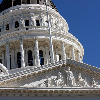AB 361 Creates Exemptions to Brown Act Virtual Meeting Requirements During a State of Emergency

September 2021
Number 26
On September 15, 2021, the Governor signed Assembly Bill (AB) 361, amending the Ralph M. Brown Act to allow local agencies to continue conducting public meetings remotely during a state of emergency, so long as certain requirements are met. As explained in more detail below, public agencies who wish to conduct meetings remotely on or after October 1, 2021, must make specific findings, every thirty days, and ensure conditions related to public participation are satisfied.
Background
Generally, if a local agency elects to use teleconferencing for a public meeting, the Brown Act requires: (1) a quorum of the legislative body to participate from within the boundaries of the agency’s jurisdiction, (2) the public agency to post notice of each teleconference location, and (3) the public be allowed to address the legislative body from each teleconference location.
Beginning in March 2020, Governor Newsom issued Executive Orders (Prior Orders) relaxing these Brown Act provisions, allowing public agencies greater flexibility in holding remote meetings during the COVID-19 pandemic. The Prior Orders, suspending the Brown Act teleconferencing requirements and confirming the use of internet-based service options for holding public meetings, were set to expire on September 30, 2021. In light of this looming deadline, AB 361 was passed and amends the Brown Act to allow public agencies to continue conducting remote meetings during a state of emergency without the need to comply with all of the teleconferencing requirements. While AB 361 was an urgency measure, effective upon the Governor’s signature, the Governor also signed a new Executive Order, clarifying that most of the requirements of AB 361 become effective October 1, 2021.
Although the Governor waived the applicability of AB 361 until October 1, 2021, local agencies retain the option of meeting before October 1 to make the required findings under AB 361 in order to hold future meetings remotely. If a local agency does not do so, it will have to have a separate meeting in October to make the necessary findings before any regular or special meetings otherwise scheduled for October can be held remotely.
Applicability of AB 361
Under the urgency legislation, a local agency may utilize the more “relaxed” Brown Act teleconferencing requirements in any of the following circumstances:
To continue to rely on the relaxed teleconferencing provisions, the local agency must reconsider the circumstances of the state of emergency and make the following findings by majority vote, every 30 days:
For all remote meetings held under AB 361, local agencies are required to meet the following public participation and notice requirements (note that some of these requirements differ from what had been in place under the Prior Orders):
Takeaways
AB 361 creates statutory exemptions to the Brown Act that extend flexibility for remote public meetings during proclaimed emergencies, through January 1, 2024. For state and local agencies that are subject to the Bagley-Keene Open Meeting Act and the Gloria Romero Open Meetings Act, AB 361 establishes similarly relaxed guidance for virtual public meetings, until January 31, 2022. State and local agencies must give the public notice and an opportunity to comment and participate at meetings in real time, even using remote means, and they must comply with certain prerequisites in order to rely on the remote meeting provisions, including reconsideration of the circumstances and need for remote meetings every 30 days. While this new law relaxes certain remote meeting requirements relating to member participation, agendas, and public accessibility at remote locations, the underlying aim of the Brown Act—to ensure meetings of local agencies be open and public—remains.
If you have any questions about AB 361 or about the Brown Act or board governance issues in general, please contact the author of this Client News Brief or an attorney at one of our eight offices located statewide. You can also subscribe to our podcasts, follow us on Facebook, Twitter and LinkedIn or download our mobile app.
Number 26
On September 15, 2021, the Governor signed Assembly Bill (AB) 361, amending the Ralph M. Brown Act to allow local agencies to continue conducting public meetings remotely during a state of emergency, so long as certain requirements are met. As explained in more detail below, public agencies who wish to conduct meetings remotely on or after October 1, 2021, must make specific findings, every thirty days, and ensure conditions related to public participation are satisfied.
Background
Generally, if a local agency elects to use teleconferencing for a public meeting, the Brown Act requires: (1) a quorum of the legislative body to participate from within the boundaries of the agency’s jurisdiction, (2) the public agency to post notice of each teleconference location, and (3) the public be allowed to address the legislative body from each teleconference location.
Beginning in March 2020, Governor Newsom issued Executive Orders (Prior Orders) relaxing these Brown Act provisions, allowing public agencies greater flexibility in holding remote meetings during the COVID-19 pandemic. The Prior Orders, suspending the Brown Act teleconferencing requirements and confirming the use of internet-based service options for holding public meetings, were set to expire on September 30, 2021. In light of this looming deadline, AB 361 was passed and amends the Brown Act to allow public agencies to continue conducting remote meetings during a state of emergency without the need to comply with all of the teleconferencing requirements. While AB 361 was an urgency measure, effective upon the Governor’s signature, the Governor also signed a new Executive Order, clarifying that most of the requirements of AB 361 become effective October 1, 2021.
Although the Governor waived the applicability of AB 361 until October 1, 2021, local agencies retain the option of meeting before October 1 to make the required findings under AB 361 in order to hold future meetings remotely. If a local agency does not do so, it will have to have a separate meeting in October to make the necessary findings before any regular or special meetings otherwise scheduled for October can be held remotely.
Applicability of AB 361
Under the urgency legislation, a local agency may utilize the more “relaxed” Brown Act teleconferencing requirements in any of the following circumstances:
- There is a proclaimed state of emergency, and state or local officials have imposed or recommended measures to promote social distancing; or
- There is a proclaimed state of emergency, and the local agency’s meeting is for the purpose of determining, by majority vote, whether as a result of the emergency, meeting in person would present imminent risks to the health or safety of attendees; or
- There is a proclaimed state of emergency, and the local agency has determined, by majority vote, that as a result of the emergency meeting in person would present an imminent risk to the health or safety of attendees.
To continue to rely on the relaxed teleconferencing provisions, the local agency must reconsider the circumstances of the state of emergency and make the following findings by majority vote, every 30 days:
- The state of emergency continues to directly impact the ability of the members to meet safely in person; or
- State or local officials continue to impose or recommend measures to promote social distancing.
For all remote meetings held under AB 361, local agencies are required to meet the following public participation and notice requirements (note that some of these requirements differ from what had been in place under the Prior Orders):
- Meeting agendas and notices must describe how members of the public may access the meeting and offer public comment, and identify and include an opportunity for all persons to attend via a call-in option or an internet-based service option;
- The public must have the opportunity to address the legislative body and comment in real time. The local agencies may still allow for the public to submit comments in advance of the meeting, but the local agency must also provide an option for the public to comment in real time;
- If a timed public comment period is provided on an agenda, whether on a specific agenda item or in general, registration and the public comment period cannot close until the time has elapsed. If public comment is taken separately on each agenda item, the legislative body must allow a reasonable amount of time per item to allow members of the public the opportunity to provide public comment, register, or otherwise be recognized for the purpose of providing public comment;
- Local agencies are permitted to use platforms which, incidental to their use and deployment, may require users to register for an account with that platform so long as the platform is not under the control of the local agency;
- If there is a disruption in the broadcast of a public meeting using the call-in option or the internet-based option, or there is a disruption within the agency’s control which prevents members of the public from offering comments, the agency must not take any action on items appearing on the agenda until full access is restored.
Takeaways
AB 361 creates statutory exemptions to the Brown Act that extend flexibility for remote public meetings during proclaimed emergencies, through January 1, 2024. For state and local agencies that are subject to the Bagley-Keene Open Meeting Act and the Gloria Romero Open Meetings Act, AB 361 establishes similarly relaxed guidance for virtual public meetings, until January 31, 2022. State and local agencies must give the public notice and an opportunity to comment and participate at meetings in real time, even using remote means, and they must comply with certain prerequisites in order to rely on the remote meeting provisions, including reconsideration of the circumstances and need for remote meetings every 30 days. While this new law relaxes certain remote meeting requirements relating to member participation, agendas, and public accessibility at remote locations, the underlying aim of the Brown Act—to ensure meetings of local agencies be open and public—remains.
If you have any questions about AB 361 or about the Brown Act or board governance issues in general, please contact the author of this Client News Brief or an attorney at one of our eight offices located statewide. You can also subscribe to our podcasts, follow us on Facebook, Twitter and LinkedIn or download our mobile app.
As the information contained herein is necessarily general, its application to a particular set of facts and circumstances may vary. For this reason, this News Brief does not constitute legal advice. We recommend that you consult with your counsel prior to acting on the information contained herein.





